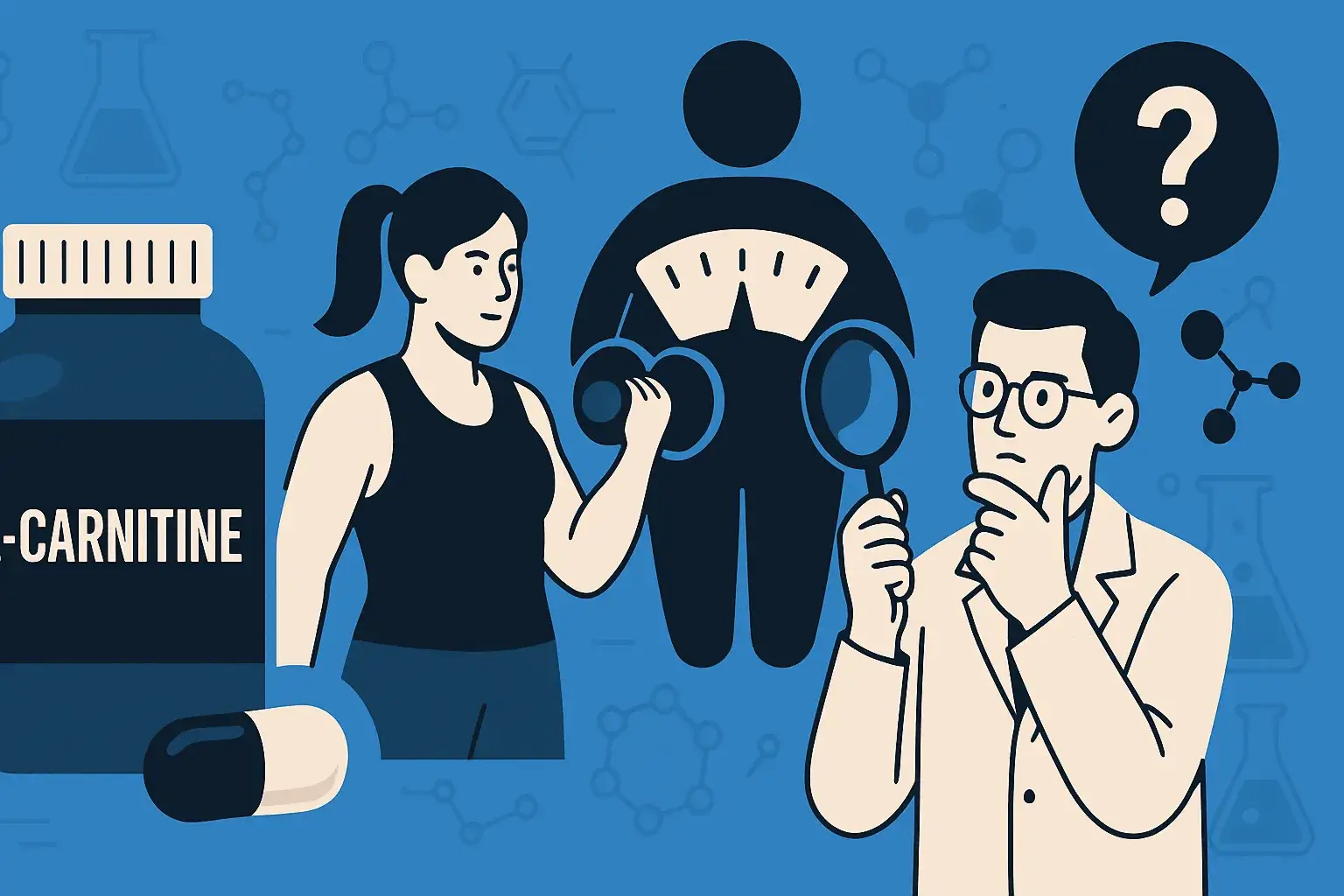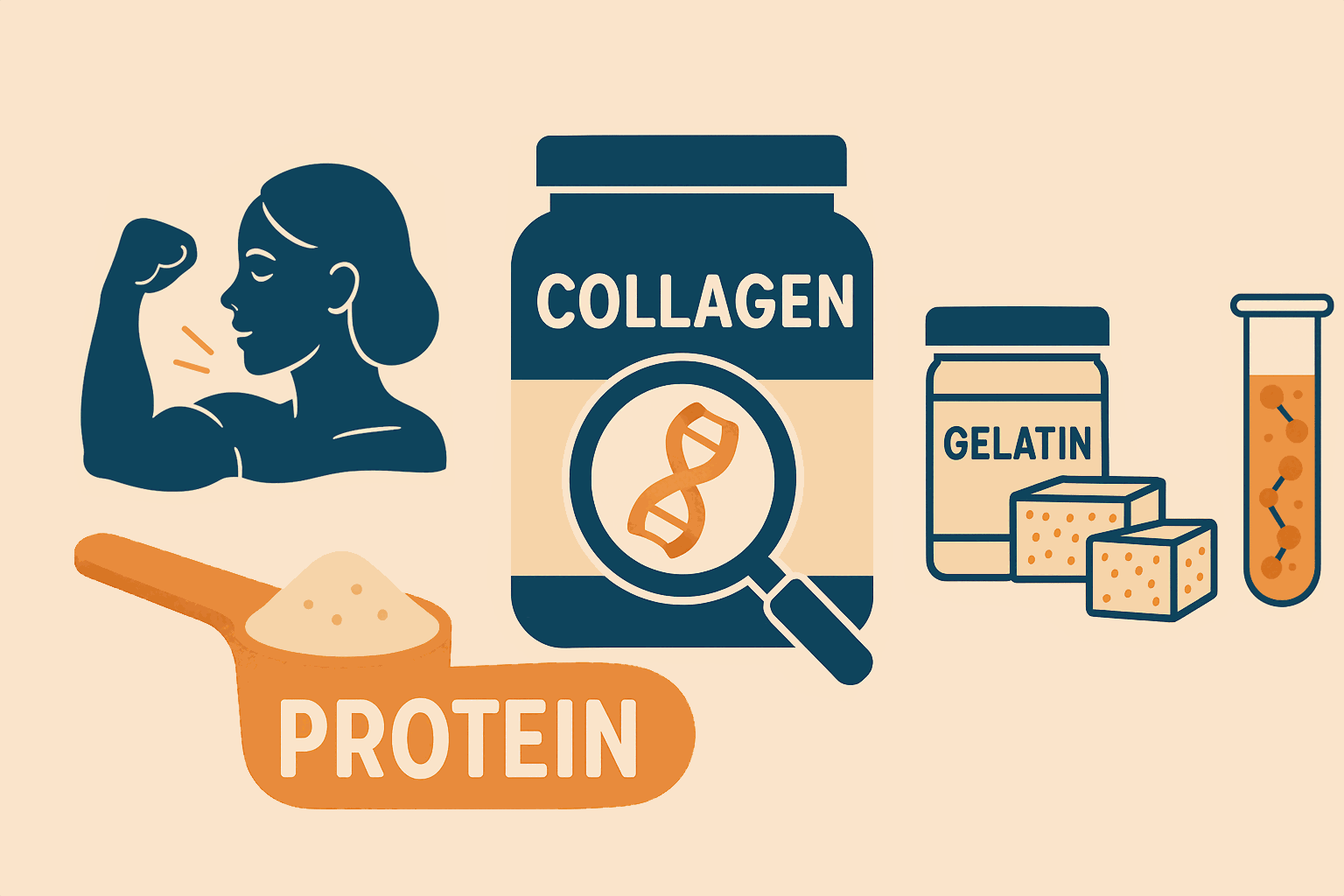
L-Carnitine Explained: Unpacking the Benefits, Risks, and Scientific Truth
- Marcus Reed
- Health , Sports nutrition , Science , Wellness
- May 19, 2025
Table of Contents
Fast Facts: L-Carnitine Key Insights (TL;DR)
- Core Function: L-carnitine is crucial for transporting fatty acids into mitochondria for energy production.
- Fat Loss Reality: It’s not a miracle fat burner; notable weight loss benefits are mainly observed in overweight or obese individuals when combined with diet changes [2].
- Performance & Recovery: Long-term use (12+ weeks) with carbohydrates can increase muscle carnitine, potentially aiding exercise metabolism, glycogen sparing, and muscle recovery [1], [3].
- Age-Related Benefits: May help reduce fatigue and improve muscle mass in some elderly individuals, particularly centenarians [4].
- TMAO Concern: Supplementation increases TMAO, a compound linked to atherosclerosis. While direct causation in humans isn’t definitively proven, caution is advised, especially for those with cardiovascular or kidney issues [5], [6].
- Who Might Benefit?: Most suitable for vegetarians, individuals with diagnosed carnitine deficiency, and athletes focusing on long-term recovery support [14], [15].
- Natural Sources: Prioritize L-carnitine from whole foods like red meat and dairy before considering supplements [15].
L-Carnitine: Separating Science from Supplement Hype
L-carnitine is a popular supplement, often touted for its fat-burning and performance-enhancing capabilities. But how much of this is marketing hype, and what does the science actually say? This article delves into the evidence-based truths about L-carnitine, its real benefits, potential risks, and who might genuinely benefit from its use.
What Is L-Carnitine and Why Is It Important?
L-carnitine is an amino acid derivative, naturally synthesized in the human body primarily by the liver and kidneys from the essential amino acids lysine and methionine [14]. Its fundamental role is critical for energy metabolism: L-carnitine acts as a shuttle, transporting long-chain fatty acids across the inner mitochondrial membrane into the mitochondrial matrix. Once inside, these fatty acids undergo beta-oxidation, a process that breaks them down to produce adenosine triphosphate (ATP), the body’s primary energy currency [1].
While our bodies can produce L-carnitine, we also obtain it from dietary sources. Red meat, especially beef, is a particularly rich source, followed by other animal products like fish, poultry, and dairy [15]. For individuals with lower dietary intake, such as vegetarians or vegans, or those with increased metabolic demands or certain medical conditions, supplementation might be considered.
The Truth About L-Carnitine and Fat-Burning Claims
One of the most pervasive claims about L-carnitine is its ability to act as a potent fat burner, promising effortless weight loss. However, the scientific evidence presents a more nuanced picture:
- Short-term Supplementation and Fat Oxidation: Contrary to popular belief, studies involving short-term L-carnitine supplementation (typically four weeks or less) in healthy individuals have generally not shown a significant impact on fat oxidation rates or endurance performance during exercise [2], [14]. Your body’s carnitine stores are not easily or quickly altered by short-term intake alone.
- Long-term Use and Muscle Carnitine: More promising results emerge with long-term supplementation. Research indicates that chronic oral ingestion of L-carnitine (e.g., 2 grams twice daily) for at least 12 to 24 weeks, particularly when co-ingested with carbohydrates (which stimulates insulin and aids carnitine uptake into muscle [8]), can increase muscle carnitine content by approximately 21% [1]. This increase can, in turn, modestly alter muscle fuel metabolism during exercise.
- Weight Loss Benefits – A Closer Look: A systematic review and meta-analysis concluded that L-carnitine supplementation can lead to a modest but statistically significant reduction in body weight, BMI, and fat mass. However, these effects were more pronounced in overweight and obese individuals [2]. For lean athletes or those already maintaining a healthy weight, the body composition changes are often minimal.
Practical Takeaway: L-carnitine is not a magic bullet for shedding fat quickly. For generally healthy, active individuals, its primary value may lie more in supporting long-term metabolic adaptations and recovery rather than dramatic, immediate fat loss. If weight loss is the goal, L-carnitine might offer slight support to a comprehensive plan of diet and exercise, especially for those carrying excess weight.
Enhancing Performance & Accelerating Recovery: Where the Science Stands

Beyond fat metabolism, L-carnitine has been investigated for its potential to enhance exercise performance and improve recovery.
Muscle Adaptations with Long-Term Use
Consistent, long-term L-carnitine supplementation, when combined with carbohydrates, has been shown to lead to several favorable muscle adaptations:
- Altered Gene Expression: Studies have demonstrated that 12 weeks of L-carnitine supplementation alongside carbohydrate intake can alter the expression of multiple genes involved in fuel metabolism pathways within muscle tissue, potentially enhancing mitochondrial efficiency and the muscle’s ability to utilize different fuel sources [1]. For example, one study noted changes in 42 genes related to fuel catabolism.
- Glycogen Sparing Effect: By potentially increasing fat utilization during lower-intensity exercise, L-carnitine may help spare muscle glycogen (stored carbohydrates). Athletes supplemented with L-carnitine and carbohydrates showed reduced muscle glycogen use during low-intensity (50% $VO_{2max}$) exercise and improved work output during high-intensity (80% $VO_{2max}$) exercise [1]. This glycogen-sparing effect could delay fatigue during prolonged activities.
Recovery Benefits
L-carnitine may also play a role in how the body recovers after strenuous physical activity:
- Reduced Muscle Soreness and Damage: Supplementation (e.g., 2g/day for 3 weeks) has been shown to decrease markers of muscle damage, such as creatine kinase (CK) release, and reduce perceptions of muscle soreness after eccentric exercise [3].
- Enhanced Blood Flow and Oxygen Supply: Some research suggests L-carnitine can improve blood flow and oxygen supply to muscle tissue, which could aid in the clearance of metabolic byproducts and delivery of nutrients for repair [12].
- Antioxidant Effects: L-carnitine possesses antioxidant properties, potentially by chelating iron and reducing free radical generation. It may also boost the activity of antioxidant enzymes like glutathione peroxidase, helping to counteract the oxidative stress induced by intense training [11].
Important Limitation: These performance and recovery benefits are generally observed with consistent, long-term use (often 12 weeks or more) and frequently require strategic co-ingestion with carbohydrates or engagement in resistance training to maximize muscle carnitine uptake and efficacy. It’s not a pre-workout quick fix.
Age-Specific Considerations: Benefits Beyond Young Athletes
The interest in L-carnitine extends to its potential benefits for aging populations:
- Improvements in Centenarians: One notable study involving centenarians (individuals aged 100 years or older) found that 24 weeks of L-carnitine supplementation (2g/day) led to significant improvements. Participants experienced an average increase in total muscle mass by 3.8 kg (compared to a 0.8 kg loss in the placebo group), a reduction in fat mass, decreased physical and mental fatigue, and improved cognitive function [4].
- Older Adults and Muscle Function: For the broader older adult population, the evidence is more mixed. While L-carnitine may help combat age-related declines in mitochondrial function and reduce fatigue, its impact on strength gains can be variable. Some reviews suggest that benefits for physical performance in older individuals are more likely if a carnitine deficiency or specific need exists [12]. For instance, a claim about L-carnitine showing no strength gains in women aged 65-70 needs specific sourcing, as general reviews indicate benefits are conditional.
The TMAO Controversy: Understanding the Cardiovascular Risks
A significant point of discussion surrounding L-carnitine, particularly from red meat and supplements, is its link to Trimethylamine-N-Oxide (TMAO). Here’s what you need to know:
- TMAO Production: Gut bacteria metabolize L-carnitine (and choline, another nutrient found in red meat and eggs) into trimethylamine (TMA). The liver then converts TMA into TMAO [5].
- TMAO and Atherosclerosis: Some research has linked higher circulating levels of TMAO to an increased risk of atherosclerosis (hardening of the arteries) and major adverse cardiovascular events [5].
- Supplementation Impact: Studies have shown that L-carnitine supplementation can indeed raise fasting TMAO levels. For example, one study found that daily supplementation led to a 10-fold increase in plasma TMAO concentrations within three months in healthy aged women, although this study did not find corresponding increases in markers of atherosclerosis [6]. Another study in hemodialysis patients also showed TMAO increases with L-carnitine, but paradoxically, also showed reductions in some markers of vascular injury [9].
- Causation vs. Association: It is crucial to understand that while an association between TMAO and cardiovascular disease has been observed, direct causation in humans has not been definitively proven. TMAO might be a biomarker rather than a causative agent, or its effects might be complex and context-dependent.
- Influencing Factors: The conversion of L-carnitine to TMAO and its subsequent levels are heavily influenced by an individual’s gut microbiome composition, dietary patterns (e.g., regular meat-eaters may adapt differently than vegans), and kidney function, as kidneys are responsible for clearing TMAO from the body [13].
Word of Caution: Individuals with pre-existing kidney disease or those at high risk for cardiovascular disease should exercise caution and consult their healthcare provider before considering long-term or high-dose L-carnitine supplementation due to the TMAO concern.
Practical Recommendations: Who Should Genuinely Consider L-Carnitine?
Based on current scientific understanding, L-carnitine supplementation isn’t a universal necessity. Here’s a breakdown of who might derive the most benefit:

Potentially Good Candidates:
- Vegetarians and Vegans: Individuals following strict plant-based diets have significantly lower dietary L-carnitine intake and may have lower muscle carnitine concentrations. Supplementation could help normalize these levels [14].
- Individuals with Documented Carnitine Deficiency: Primary carnitine deficiency (a rare genetic disorder) or secondary deficiencies due to certain medical conditions (e.g., kidney disease requiring dialysis, certain metabolic disorders) or medications may necessitate L-carnitine supplementation under medical supervision [15].
- Athletes Focused on Long-Term Recovery and Metabolic Support: Endurance athletes or those engaged in high-volume training might consider it as part of a long-term strategy to support recovery and muscle adaptation, especially if dietary intake is suboptimal [12].
- Certain Older Adults: As discussed, some older individuals, particularly those experiencing significant fatigue or muscle loss, might benefit, though this should be assessed on a case-by-case basis [4].
When to Reconsider or Avoid:
- If Seeking Quick Fat Loss: As established, it’s not an effective standalone solution for rapid weight reduction in generally healthy individuals.
- Individuals with Impaired Kidney Function: Due to the role of kidneys in carnitine and TMAO clearance, those with kidney problems should generally avoid supplementation unless prescribed by a doctor [9], [13].
- If Expecting Immediate Performance Boosts: The ergogenic effects are typically associated with chronic use and increased muscle carnitine stores, not acute intake.
Dosage, Safety, and Potential Side Effects
If considering L-carnitine, it’s essential to be aware of effective dosages and safety:
- Effective Dosage Protocols: For increasing muscle carnitine and potentially seeing performance/recovery benefits, studies often use doses ranging from 1 to 4 grams per day (commonly 2 grams taken twice daily), for at least 12 weeks, often with carbohydrates to enhance uptake [1], [15]. For other applications, doses may vary.
- Maximum Safe Dose for Long-Term Use: The European Food Safety Authority (EFSA) and other regulatory bodies generally consider supplemental L-carnitine safe at doses up to 2 grams per day for long-term use in the general healthy population [7], [15].
- Potential Side Effects: While generally well-tolerated, L-carnitine can cause mild gastrointestinal issues such as nausea, vomiting, abdominal cramps, and diarrhea, especially at higher doses (3-6 grams/day). A characteristic “fishy” body odor can occur due to the excretion of unmetabolized trimethylamines [15].
Final Verdict: Is L-Carnitine a Worthwhile Supplement?
L-carnitine is far from a miracle supplement, but it’s not without its merits when used appropriately and with realistic expectations. It serves as a long-term metabolic modulator rather than a quick fix.
Its scientifically supported benefits—such as a modest increase in muscle carnitine content, potential improvements in exercise metabolism during prolonged activity, enhanced recovery from strenuous exercise, and some positive effects in specific aging populations—typically materialize only with consistent, disciplined use over several weeks or months, often alongside specific dietary strategies (like carbohydrate co-ingestion) and training regimens.
Always consider the potential cardiovascular implications related to TMAO, especially if you have underlying health conditions. Prioritizing whole-food sources of L-carnitine, such as grass-fed beef, lamb, and dairy products, is a sensible first step. If you do choose to supplement, opt for reputable brands and discuss it with your healthcare provider or a registered dietitian to determine if it aligns with your individual health needs and goals.
Ultimately, L-carnitine can be a useful tool for a select few under specific circumstances, but it should always complement, not replace, the foundational pillars of good health: a balanced diet, regular exercise, and adequate rest.
Frequently Asked Questions (Q&A)
Q1: What is L-carnitine's main role in the body?
Q2: Can L-carnitine supplements genuinely help me lose weight quickly?
Q3: Are there any significant risks associated with taking L-carnitine?
Q4: How long does it typically take to see L-carnitine benefits for exercise performance or recovery?
Q5: What are the best natural food sources of L-carnitine?
Disclaimer
The information provided on BioBrain is intended for educational purposes only and is grounded in science, common sense, and evidence-based medicine. It is not a substitute for professional medical advice, diagnosis, or treatment. Always consult a qualified healthcare provider before making significant changes to your diet, exercise routine, or overall health plan.
References
- Wall BT, Stephens FB, Constantin-Teodosiu D, et al. (2011) "Chronic oral ingestion of L-carnitine and carbohydrate increases muscle carnitine content and alters muscle fuel metabolism during exercise in humans"
- Askarpour M, Hadi A, Miraghajani M, et al. (2020) "Beneficial effects of l-carnitine supplementation for weight management in overweight and obese adults: An updated systematic review and dose-response meta-analysis"
- Giamberardino MA, Dragani L, Valente R, et al. (1996) "Effects of prolonged L-carnitine administration on delayed muscle pain and CK release after eccentric effort"
- Malaguarnera M, Cammalleri L, Gargante MP, et al. (2007) "L-Carnitine treatment reduces severity of physical and mental fatigue and increases cognitive functions in centenarians"
- Koeth RA, Wang Z, Levison BS, et al. (2013) "Intestinal microbiota metabolism of L-carnitine, a nutrient in red meat, promotes atherosclerosis"
- Samulak JJ, Sawicka AK, Hartmane D, et al. (2019) "L-Carnitine supplementation increases Trimethylamine-N-oxide but not markers of atherosclerosis in healthy aged women"
- Hathcock JN, Shao A. (2006) "Risk assessment for carnitine"
- Stephens FB, Constantin-Teodosiu D, Laithwaite D, et al. (2006) "Insulin stimulates L-carnitine accumulation in human skeletal muscle"
- Fukami K, Yamagishi S, Sakai K, et al. (2015) "Oral L-carnitine supplementation increases trimethylamine-N-oxide but reduces markers of vascular injury in hemodialysis patients"
- Rebouche CJ. (1991) "Quantitative estimation of absorption and degradation of a carnitine supplement by human adults"
- Gülçin İ. (2006) "Antioxidant and antiradical activities of L-carnitine"
- Fielding R, Riede L, Lugo JP, Bellamine A. (2018) "L-Carnitine Supplementation in Recovery after Exercise"
- Tang WHW, Hazen SL. (2014) "The contributory role of gut microbiota in cardiovascular disease"
- Linus Pauling Institute. (2025) "Carnitine"
- National Institutes of Health. Office of Dietary Supplements. (2025) "Carnitine: Fact Sheet for Health Professionals"
Tags :
- L carnitine
- Sports nutrition
- Supplements
- Fat burning myth
- Boost metabolism
- L carnitine tmao risk
- Gut health supplements
- Fitness supplements reviewed
- Evidence based health
- L carnitine for muscle recovery
- L carnitine dosage and safety
- Natural l carnitine sources


